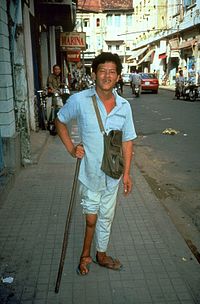
Photo from wikipedia
On 25 August 2020, the World Health Organization (WHO) declared Africa to be free from poliomyelitis, an announcement that gave hope for the total eradication of this disease. Indeed, owing… Click to show full abstract
On 25 August 2020, the World Health Organization (WHO) declared Africa to be free from poliomyelitis, an announcement that gave hope for the total eradication of this disease. Indeed, owing to worldwide vaccination efforts that began in the 1980s, poliomyelitis has now been almost completely eradicated, and remains endemic only in Afghanistan and Pakistan1 Nevertheless, due to socio-political issues in the world, total eradication could prove more difficult to achieve. Indeed, the conflict in Afghanistan and the interruption of vaccinations caused by the COVID-19 pandemic has given rise to an exponential increase in polio cases in 2020, when some 1,226 cases of all forms of poliomyelitis were recorded, up from 138 in 20182 (Figure 1). In the autumn of 2021, vaccinations resumed in Afghanistan, giving hope of defeating the disease definitively. In the last few months, however, the disquieting occurrence of a few outbreaks has highlighted the need to take a firm stance on the prevention of poliomyelitis through vaccination. Meanwhile in Ukraine, the combination of the armed conflict and low immunisation coverage preceding it has brought about an outbreak of poliomyelitis due to a circulating type-2 vaccine-derived
Journal Title: Pathogens and Global Health
Year Published: 2022
Link to full text (if available)
Share on Social Media: Sign Up to like & get
recommendations!